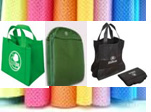STYLE OPTIONS
- Recycled P.E.T
-

- Recycled PET is recycled virgin PET material. After consumption, the recyclable PET products are collected and sorted by type at recycling centers, where they are crushed, pressed into bales, and then shredded and refined into PET flakes. These flakes are transformed into the raw materials for end products of different utilities. Recycled PET has all the flexibility and advantages of virgin polyester materials. It can be made into fabric of different weight and thickness to suit your needs. Ecozuri can provide recycled content verification issued by material providers for our custom made RPET products.
- Organic cotton
-

- Organic cotton is grown using methods and materials that have a low impact on the environment. Organic production systems replenish and maintain soil fertility, reduce the use of toxic and persistent pesticides and fertilizers, and build biologically diverse agriculture. Third-party certification organizations verify that organic producers use only methods and materials allowed in organic production. Organic cotton is grown without the use of toxic and persistent pesticides and synthetic fertilizers. In addition, federal regulations prohibit the use of genetically engineered seed for organic farming. Minimal order quantity and long delivery time apply for custom made organic cotton products due to our rigorous authentication process.
- Canvas
-

- Modern canvas is usually made of cotton. It differs from other heavy cotton fabrics, such as denim, in being plain weave rather than twill weave. Canvas comes in two basic types: plain and duck. The threads in duck canvas are more tightly woven. Canvas is classified in two ways: by weight (ounces per square yard) and by a graded number system. The numbers run in reverse of the weight so a number 10 canvas is lighter than a number 4.
- Jute
-

- Jute is a natural fiber with golden and silky shine. It is the cheapest vegetable fiber procured from the skin of the plant's stem. It has high tensile strength, low extensibility, and ensures better breathability of fabrics. Jute fiber is 100% bio-degradable and recyclable and thus environmentally friendly. Advantages of jute include good insulating and antistatic properties, as well as having low thermal conductivity and moderate moisture regain. Other advantages of jute include acoustic insulating properties and manufacture with no skin irritations.
- Hemp
-

- Hemp is the name of the soft, durable fiber that is cultivated from plants of the Cannabis genus, cultivated for industrial and commercial (non-drug) use. Hemp is used for a wide variety of purposes, including the manufacture of cordage of varying tensile strength, clothing, and nutritional products. The fibers can be used in 100% hemp products, but are commonly blended with other organic fibers such as flax, cotton or silk.
- Bamboo Fabrics
-

- Bamboo is a natural textile made from the pulp of the bamboo grass. Bamboo fabric has been growing in popularity because it has many unique properties and is more sustainable than most textile fibers. Bamboo fabric is light and strong, has excellent wicking properties, and is, to some extent, antibacterial. Bamboo fiber resembles cotton in its unspun form, a puffball of light, airy fibers. To make bamboo fiber, bamboo is heavily pulped until it separates into thin component threads of fiber, which can be spun and dyed for weaving into cloth.
- Nylon
-

- A manufactured fiber in which the fiber forming substance is a long-chain synthetic polyamide in which less than 85% of the amide-linkages are attached directly (-CO-NH-) to two aliphatic groups. Nylon has the ability to be very lustrous, semi lustrous, or dull. It is also highly abrasion resistance and resilient. Nylon is a good material for reusable bags that are easy care, flexible and durable.
- Polyester
-

- Polyester as a specific material most commonly referring to polyethylene terephthalate (PET). Polyester is a manufactured product made from synthesized polymers. It tends to be very resilient, quick drying, resistant to biological damage such as mold and mildew, easy to wash, and able to hold its form well. Polyester fabrics and fibers are extremely strong and highly durable. Polyester is a common material for reusable bags.
- PP non-woven
-

- Polypropylene is a plastic that is manufactured through a high heat source. It's molecular formula is (C3 H6)x. There are a few different names such as Polypropene, Polipropene 25, Propylene polymers, and more. As opposed to cotton or other natural fibers, which are woven, Nonwoven Polypropylene is a fabric-like material made from long fibers, bonded together by mechanical, heat or solvent treatment.
- PP Woven
-

- PP woven is a woven form of polypropylene fabric. Manufacturing PP woven material first involves Cast extrusion of a wide sheet of PP which is cut into long trends which are then woven together to make a continuous sheet of woven material. PP woven is dimensionally stable, chemical and biological resistant, water proof and U/V resistant.
